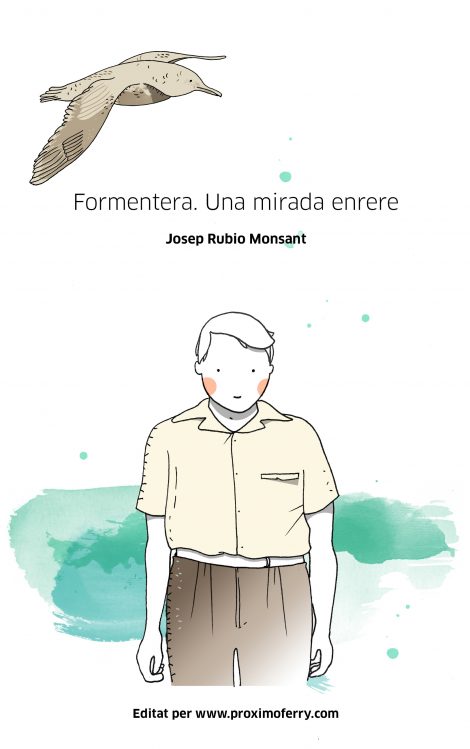“FORMENTERA. A LOOK BACK “, STORIES OF THE MEMORY OF AN ISLAND
Próximo Ferry | April 23, 2024

Journalist Josep Rubio presents his first book, a selection of articles that reflect life in Formentera’s society before the arrival of tourism.
The author has gathered testimonies from 18 protagonists in a work that aims to encourage readers to listen to our elders and their life experiences.
Text: David Setbetes | Photographs: Próximo Ferry
We meet on the terrace of our usual bar, a croissant and coffee for him, and a cortado for me. He doesn’t forget his hand-rolled cigarette, which he starts to smoke as I turn on the recorder.
I chat with Josep Rubio, better known as Pepo; friend, journalist, and author of his first book.
Writing is not new to him. He confesses, however, that the amount of work to bring this work to life has been a major challenge, at times exhausting. It involved him and a long list of people who helped him by sharing their life experiences, providing historical data, perspectives to untangle certain parts of the journalistic narrative, and encouragement to complete ‘Formentera. A Look Back.’
It all began about two and a half years ago when the editors of Próximo Ferry proposed that he develop content for their blog, giving him the freedom to choose themes with Formentera as a common denominator. Thus, he began publishing articles about nature, geology, excursions, or history, among others. But he realized that there was a type of article he especially enjoyed doing: sitting down with a person, more or less older, and listening to their experiences to then translate them into words on paper.
To know where we are going, we have to be clear about where we come from. It is in our past where the origin and often the explanation of why we are the way we are lie, both individually and socially. Therefore, preserving memory is of vital importance, and Formentera has an advantage over other regions; as an island, as a distant piece of land, it has been able to better preserve customs and has taken longer to be invaded by the so-called modernity.
In Formentera, then, we are fortunate to live today with people who can transport us to ways of life that in Catalonia or Valencia date back at least to the early 20th century, while in the Pitiuses, they were prevalent until the 1950s. Having these testimonies from the pre-tourism era and being able to talk to them about their experiences translated into the creation of numerous articles that were published periodically on this blog.
It has been a kind job, also delicate, since some of the interviewees did not give importance to their experiences or even felt a bit embarrassed to explain how they lived. Building trust and knowing how to value the experiences shared have been the two most important guidelines when creating a comfortable atmosphere that allowed the stories of the island’s elders to flow.
It’s not about asking many questions,” Pepo confesses to me, “but rather letting the protagonists speak and sometimes veer towards parallel topics that seemingly have no relation to the central issue but end up complementing it or originating a new storyline.
Thus, for example, the story of Maria Rosa Coll Rotoló is born. Originally, I wanted to talk about people like her father, who had to flee the island to Algeria due to Francoist repression. But the conversation shifts to Maria Rosa’s arrival in Formentera; a 10-year-old girl accustomed to the French education of the Algerian colonial schools who lands on the island in the 1950s and experiences the contrasts between the society she comes from and the host society, with the cultural shock that this entails.
This is one of the eighteen stories that we will find in a work of about eighty pages, quick to read and intended for those who appreciate taking a book to the beach and disconnecting from their phone for a while.
However, it is a book that aims to give a voice to our elders, to experiences that are not as distant as they may seem and that call for sitting down next to grandma, asking her what she did when she was young, and truly listening. Perhaps, in the age of series and the Internet, the best stories are the ones we find at home.
I press the stop button on the recorder. Twenty minutes of conversation to translate into an article where the interviewer has become the interviewed. I fear leaving some questions unasked, but you always end up missing some.
We chat a bit more with Pepo; about politics, work, acquaintances, and small talk…
Before saying goodbye, he remembers the acknowledgments section, headed by Patricia Gea, his partner, advisor, and illustrator of this ‘Mirada enrere’. He also highlights Santi Colomar, historian; Vicent Ferrer, writer and prologue author of the book; and Toni Roig, editor.
We shake hands and arrange to meet for Sant Jordi. He’ll be busy this year.
If you want to know where to buy the book, click here.